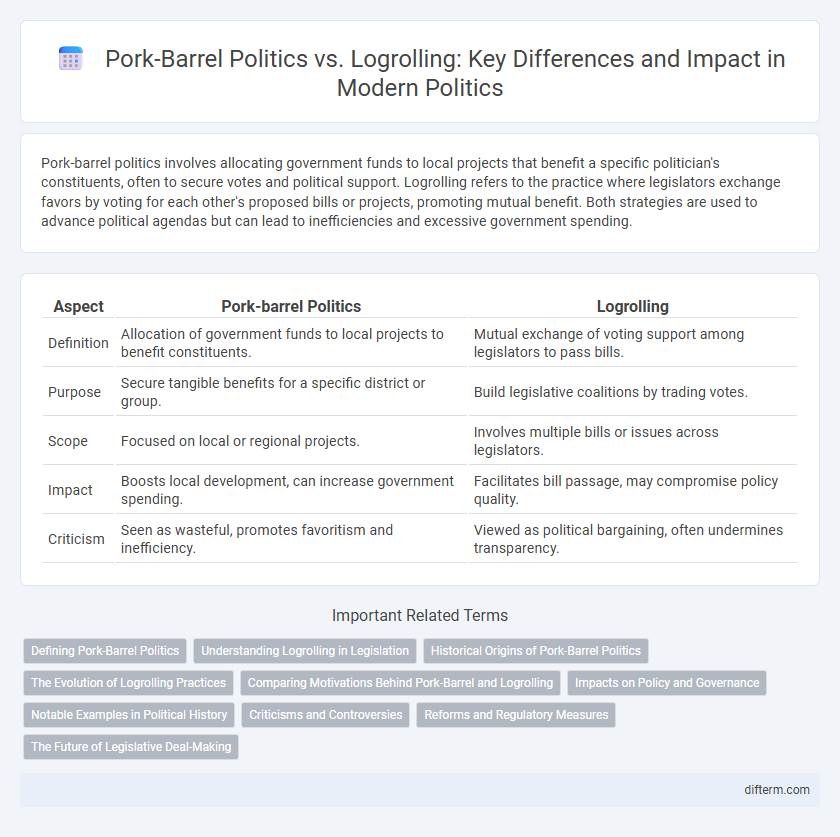Pork-barrel politics involves allocating government funds to local projects that benefit a specific politician's constituents, often to secure votes and political support. Logrolling refers to the practice where legislators exchange favors by voting for each other's proposed bills or projects, promoting mutual benefit. Both strategies are used to advance political agendas but can lead to inefficiencies and excessive government spending.
Table of Comparison
| Aspect | Pork-barrel Politics | Logrolling |
|---|---|---|
| Definition | Allocation of government funds to local projects to benefit constituents. | Mutual exchange of voting support among legislators to pass bills. |
| Purpose | Secure tangible benefits for a specific district or group. | Build legislative coalitions by trading votes. |
| Scope | Focused on local or regional projects. | Involves multiple bills or issues across legislators. |
| Impact | Boosts local development, can increase government spending. | Facilitates bill passage, may compromise policy quality. |
| Criticism | Seen as wasteful, promotes favoritism and inefficiency. | Viewed as political bargaining, often undermines transparency. |
Defining Pork-Barrel Politics
Pork-barrel politics involves allocating government funds to local projects that primarily benefit a specific constituency, often to secure votes rather than address broader policy needs. This practice contrasts with logrolling, where legislators exchange support for each other's proposals to ensure mutual benefits in passing bills. Pork-barrel projects typically enhance political support through visible local investments, whereas logrolling emphasizes strategic legislative collaboration.
Understanding Logrolling in Legislation
Logrolling in legislation involves lawmakers exchanging support for each other's bills to secure mutual benefits, often leading to the passage of projects unrelated to broader public interest. Unlike pork-barrel politics, which centers on directing government funds to specific local projects, logrolling emphasizes vote-trading among legislators to advance diverse and sometimes controversial measures. This strategy can increase legislative efficiency but may also obscure transparency and prioritize narrow interests over policy effectiveness.
Historical Origins of Pork-Barrel Politics
Pork-barrel politics originated in the 19th-century United States as legislators secured government funds for localized projects to benefit their constituents, often to gain political support. The term derives from the practice of distributing salted pork in barrels to slaves, metaphorically representing the allocation of government spending to specific districts. This historical foundation contrasts with logrolling, which involves the mutual exchange of political favors and votes among legislators to advance each other's projects.
The Evolution of Logrolling Practices
Logrolling in politics has evolved from informal exchanges of mutual support among legislators into more structured agreements that strategically bundle diverse interests to secure broad legislative approval. Unlike pork-barrel politics, which focuses on localized funding for constituents, modern logrolling prioritizes coalition-building that transcends regional concerns to achieve policy goals. This evolution reflects shifts in legislative norms and the increasing complexity of policy negotiations in contemporary political systems.
Comparing Motivations Behind Pork-Barrel and Logrolling
Pork-barrel politics centers on legislators securing government funds for local projects to benefit their own constituencies and boost re-election chances. Logrolling involves mutual vote trading among legislators to pass each other's preferred bills, driven by collective legislative success rather than localized benefits. While pork-barrel targets direct, tangible gains for specific districts, logrolling emphasizes strategic cooperation to advance broader policy goals.
Impacts on Policy and Governance
Pork-barrel politics often leads to inefficient allocation of government resources by prioritizing localized projects that benefit specific constituencies rather than addressing broader policy goals, which can distort public budgeting and reduce overall governance effectiveness. Logrolling, the practice of exchanging political favors through vote trading, can facilitate legislative compromise but may also entrench special interests and hinder transparent, merit-based policymaking. Both phenomena challenge accountable governance by promoting short-term political gains over long-term policy outcomes, complicating efforts to implement coherent and equitable public policies.
Notable Examples in Political History
Pork-barrel politics manifests in projects like the Alaska Highway Act of 1942, where specific districts received funding to garner political support, often criticized for prioritizing local interests over national needs. Logrolling was famously exemplified by the U.S. Congress's 19th-century practice, particularly during the 1820s Missouri Compromise debates, where legislators exchanged votes to pass mutually beneficial bills. These tactics have shaped legislative outcomes by trading localized benefits or votes to build broader coalitions in policymaking.
Criticisms and Controversies
Pork-barrel politics faces criticism for promoting wasteful government spending and fostering corruption by directing funds to localized projects for political gain. Logrolling is controversial for enabling legislators to trade favors, leading to approval of bills that may lack merit or broad public support. Both practices undermine transparency and accountability in legislative processes, contributing to public distrust in government institutions.
Reforms and Regulatory Measures
Pork-barrel politics often leads to inefficient allocation of resources, making regulatory measures essential to increase transparency and reduce misuse of public funds. Reforms targeting logrolling practices focus on promoting accountability by limiting vote trading and enforcing stricter lobbying regulations. Strengthening these frameworks can improve legislative integrity and ensure public projects serve broader societal interests rather than narrow political agendas.
The Future of Legislative Deal-Making
Pork-barrel politics and logrolling remain central strategies in legislative deal-making, influencing how lawmakers secure funding and support for local projects to satisfy their constituencies. The future of these practices will increasingly rely on transparency measures, digital record-keeping, and public scrutiny to balance effective coalition-building with ethical governance. Evolving political norms and reform initiatives aim to reduce wasteful spending while preserving cooperative negotiation essential for passing complex legislation.
Pork-barrel politics vs Logrolling Infographic

 difterm.com
difterm.com